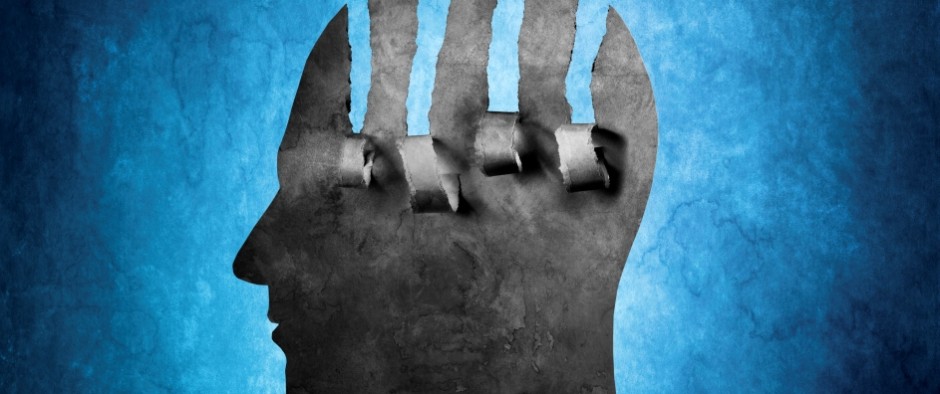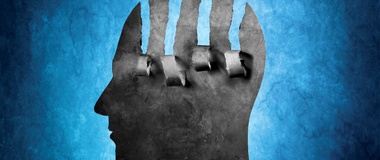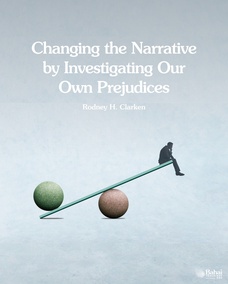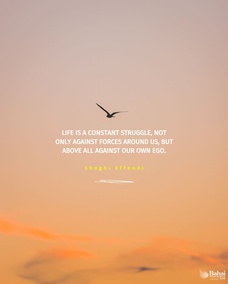The views expressed in our content reflect individual perspectives and do not represent the authoritative views of the Baha'i Faith.

I once had a job in a mental hospital, and learned to love mentally ill people.
For two years, as I worked my way through college, I served as a psychiatric technician in a ward for psychotic patients at Arizona State Mental Hospital. If you can’t picture the inside of a giant mental hospital in the middle of the last century, just think of One Flew Over The Cuckoo’s Nest – either the book or the movie. Hard to imagine, but those huge warehouses of misery and human suffering still exist in thousands of places around the world.
Working at a mental hospital allowed me the great privilege of meeting mentally ill people. If that sounds strange, well, I thought so, too, until I experienced it. Don’t get me wrong – I don’t love mental illness itself, which can cause enormous pain and suffering – but I do love many of the people who we sometimes call “mentally ill.” In my experience most of those tender souls tend toward intense emotions, great empathy for others, powerful creativity and a unique way of seeing the world.
Lots of tribal or agrarian societies don’t stigmatize, drug or hospitalize people with a different view of reality – instead, they have an exalted and revered status. Seen as shamans, seers and even visionaries, the people who experience reality in a new or unique way have a special place in those cultures — instead of receiving the fear, approbation and shunning Western societies often give their mentally ill people.
In the United States and in other so-called “first-world” countries, our treatment — or our lack of treatment — of the mentally ill has often resulted in the worst possible outcomes. Instead of confining the mentally ill in huge state hospital facilities like the one I used to work in, the United States government closed those facilities (believe me, some of them needed to be closed) and then failed to fund the neighborhood-based halfway houses and mental health treatment facilities our mentally ill population need so desperately. The result? We now house most of our mentally ill Americans in two places – on our streets as homeless people, or in our jails. As just one example of this shameless ignorance and neglect, the Los Angeles County Jail now houses America’s largest institutionalized mentally-ill population.
As a result of this massive national failure, we all suffer. The vast majority of America’s mentally ill have no place to go, no safe haven, no treatment options, no ability to seek care or counseling. Medications to treat depression sell better than any other drug. And increasingly – even though only a tiny fraction of the mentally ill population is potentially violent – we all experience the mounting incidence of injuries, suicides and mass shootings that could have been averted by a working and effective system to help, identify and treat mentally ill people.
So today – the day the World Health Organization sets aside for recognizing and focusing on mental health – many Baha’is around the world are working diligently to address the impacts of mental illness on individuals, families and societies. As a vital part of the Baha’i principle of the unity of humanity, Baha’is believe every human being has a responsibility to bring healing to others:
All are the servants of God and members of one human family. God has created all, and all are His children. He rears, nourishes, provides for and is kind to all. Why should we be unjust and unkind? This is the policy of God, the lights of which have shone throughout the world. His sun bestows its effulgence unsparingly upon all; His clouds send down rain without distinction or favor; His breezes refresh the whole earth. It is evident that humankind without exception is sheltered beneath His mercy and protection. Some are imperfect; they must be perfected. The ignorant must be taught, the sick healed, the sleepers awakened. The child must not be oppressed or censured because it is undeveloped; it must be patiently trained. The sick must not be neglected because they are ailing; nay, rather, we must have compassion upon them and bring them healing. – Abdu’l-Baha, The Promulgation of Universal Peace, p. 180.
Following the Baha’i principle of the agreement of science and religion, the Baha’i writings counsel us to seek the care of competent physicians when illness strikes. Baha’is believe that humanity can find cures for mental illnesses, just like we have for physical illnesses, if we wholeheartedly devote our energies and our resources to the task.
One Baha’i-inspired media company called SoulPancake has partnered with MTV to tell the brave stories of two college students who found their way out of the darkness of depression. Watch Life Continued: Defeating Depression on MTV – today, October 10, at 7:00 p.m ET. You can watch the first act here: Life Continued: Defeating Depression
















![[God] hath made woman and man to abide with each other in the closest companionship, and to be even as a single soul. They are two helpmates, two intimate friends, who should be concerned about the welfare of each other. If they live thus, they will pass through this world with perfect contentment, bliss, and peace of heart, and become the object of divine grace and favour in the Kingdom of heaven. But if they do other than this, they will live out their lives in great bitterness, longing at every moment for death, and will be shamefaced in the heavenly realm. Strive, then, to abide, heart and soul, with each other as two doves in the nest, for this is to be blessed in both worlds. – #AbdulBaha #Love #Marriage #Companionship #BahaiFaith
(Selections from the Writings of ‘Abdu’l-Bahá, paragraphs 92.1–92.3)](https://media.bahaiteachings.org/sb-instagram-feed-images/487782836_18497319871023335_4819806972653811469_n__v284x284__.jpeg)




Comments
Sign in or create an account
Continue with Googleor